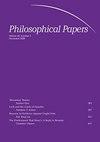Templates, Opacity, and Simulations
IF 1.3
3区 哲学
0 PHILOSOPHY
引用次数: 0
Abstract
Retrospective reflections are provided on the papers “Computer Simulations,” “Computational Science and Its Effects,” “The Philosophical Novelty of Computer Simulation Methods,” and “Numerical Experimentation” by Paul Humphreys. Some major themes are that it is the broader category of computational science, including such methods as machine learning, that is of interest, rather than just the narrower field of computer simulations; that numerical experiments and simulations are only analogous in a very weak sense to laboratory experiments; that computational science is a genuine emplacement revolution; and that syntax is of primary importance in computational modeling. Remarks are made on the logical properties of simulations, on the appropriate definition of a simulation, and on the need to take applied mathematics seriously as an autonomous field of study in the philosophy of mathematics. An argument is given for the conclusion that computational transformations preserve the causal origins of data but not their referential content.模板,不透明度和模拟
回顾了Paul Humphreys的论文“计算机模拟”,“计算科学及其影响”,“计算机模拟方法的哲学新颖性”和“数值实验”。一些主要的主题是,它是更广泛的计算科学类别,包括机器学习等方法,这是感兴趣的,而不仅仅是计算机模拟的狭窄领域;数值实验和模拟与实验室实验只有微弱的相似之处;计算科学是一场真正的定位革命;这种语法在计算建模中是最重要的。讨论了模拟的逻辑属性,模拟的适当定义,以及将应用数学作为数学哲学中独立研究领域的必要性。对于计算变换保留数据的因果起源但不保留其参考内容的结论,给出了一个论点。
本文章由计算机程序翻译,如有差异,请以英文原文为准。
求助全文
约1分钟内获得全文
求助全文
来源期刊

Philosophical Papers
PHILOSOPHY-
CiteScore
2.10
自引率
0.00%
发文量
18
期刊介绍:
Philosophical Papers is an international, generalist journal of philosophy edited in South Africa Original Articles: Articles appearing in regular issues are original, high-quality, and stand-alone, and are written for the general professional philosopher. Submissions are welcome in any area of philosophy and undergo a process of peer review based on initial editor screening and refereeing by (usually) two referees. Special Issues: Topic-based special issues are comprised of both invited and submitted papers selected by guest editors. Recent special issues have included ''Philosophy''s Therapeutic Potential'' (2014, editor Dylan Futter); ''Aging and the Elderly'' (2012, editors Tom Martin and Samantha Vice); ''The Problem of the Criterion'' (2011, editor Mark Nelson); ''Retributive Emotions'' (2010, editor Lucy Allais); ‘Rape and its Meaning/s’ (2009, editor Louise du Toit). Calls for papers for upcoming special issues can be found here. Ideas for future special issues are welcome.
 求助内容:
求助内容: 应助结果提醒方式:
应助结果提醒方式:


